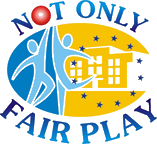
- Home
- Best
Practices - Toolkits
How to ... - Sport
Events - Guidelines
- Information
& Contacts - Project Management
A collection of student stories and initiatives about sport.
This section offers access to a collection of toolkits to promote sport at school.
-
 Physical Education Teachers
They are the main point of reference for students at school
Physical Education Teachers
They are the main point of reference for students at school
-
 Teachers
Teachers of all subjects can contribute to promote sport at school
Teachers
Teachers of all subjects can contribute to promote sport at school
-
 School Directors
Their support is a key element to promote sport at school
School Directors
Their support is a key element to promote sport at school
-
 Resources
A database of resources for teachers, PE teachers and school directors for the promotion of sport at school.
Resources
A database of resources for teachers, PE teachers and school directors for the promotion of sport at school.
Sporting events are organised in each partner country
Guidelines for policy makers willing to raise awareness on the importance of promoting sport in schools
Events
The Not Only Fair Play project has been promoted through conferences and articles.
Partnership
-
 Contractual Partners
From this section it is possible to access a description of each contractual partner of the Not Only Fair Play project.
Contractual Partners
From this section it is possible to access a description of each contractual partner of the Not Only Fair Play project.
-
 Schools
From this section it is possible to access information about the schools involved in the Not Only Fair Play Project in the 9 European countries involved.
Schools
From this section it is possible to access information about the schools involved in the Not Only Fair Play Project in the 9 European countries involved.
-
 Associated Partners
A number of associated partners officially joined the project in order to ensure the project sustainability by continuing to use the project deliverables over the next years.
Associated Partners
A number of associated partners officially joined the project in order to ensure the project sustainability by continuing to use the project deliverables over the next years.
This section of the Not Only Fair Play portal provides administrative information for the project contractual partners and for the European Commission, and is password protected.
Physical Education Teachers
Homepage > Toolkits > Physical Education Teachers

They are the main point of reference for students at school
Back to the Physical Education Teachers Toolkits
Promotion of an ethical approach to sport, including communication strategies with parents
A Toolkit for Physical Education Teacher
PE teachers and sports coaches have a responsibility to teach young people proper ways of supporting athletes according to social expectations. The Online Resources of this module provide educators with inspiration to establish sports fan codes of ethics for students at all learning levels. Besides, among the best practices to be found on the NPFP project portal there are examples of interesting initiatives aiming at promoting appropriate ways of supporting sports teams and athletes as well as creating a positive approach to other groups engaged in sport, such as athletes, spectators, coaches and sports officials.
- Spectator and Coach GuidelinesA set of guidelines for ethical conduct presented on this webpage is divided into separate sections for all participants in sporting events.
- 21 Ways Sports Fans Can Be Terrible A short review of sports fans’ inappropriate behaviour with a brief analysis of the phenomena.
- How to Prevent Fan Violence at Sporting EventsThis article concerns the issue of coping with fan violence. The webpage includes also links to related articles e.g. Understanding Crowds Key to Controlling Fan Violence and Selling Alcohol to Fight Alcohol Abuse which presen author’s interesting opinions to be discussed with students.
- Sports Fan EthicsThis webpage provides interesting information on moral and psychological implications of being a sports fan.


